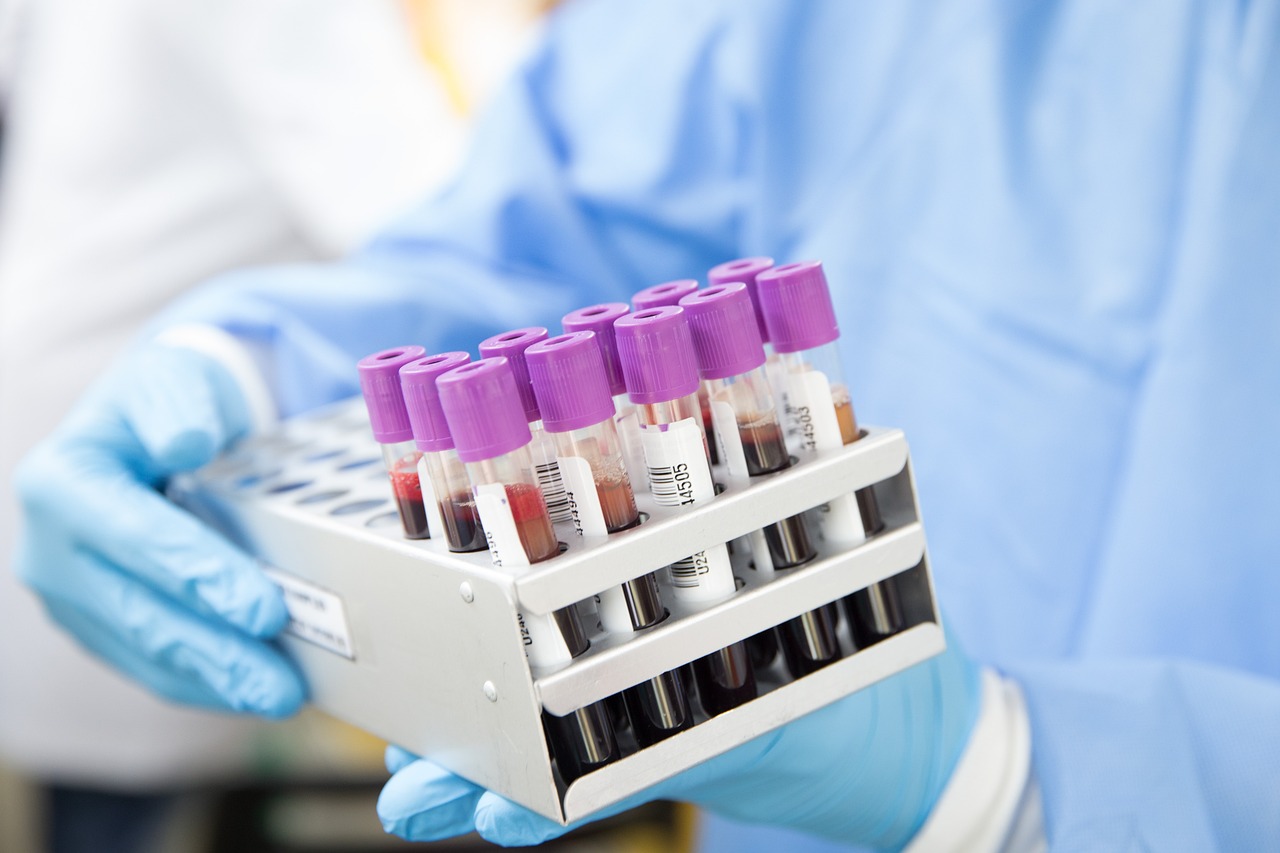AI Innovations in Healthcare: What's Next?
The healthcare industry is undergoing a remarkable transformation, driven by the rapid advancements in artificial intelligence (AI). From enhancing patient care to streamlining operational efficiency, AI innovations are reshaping the way we think about health and wellness. Imagine a world where doctors are equipped with powerful AI tools that can analyze vast amounts of data in seconds, leading to more accurate diagnoses and personalized treatment plans. This is not just a dream; it is becoming a reality. As we delve into the latest advancements in AI within healthcare, we will explore how these technologies are revolutionizing diagnostics, treatment personalization, and patient management.
Moreover, the implications of these innovations extend beyond just improving patient outcomes. They also pose significant challenges and ethical considerations that require careful navigation. How do we ensure the privacy of sensitive health information? What measures can we take to prevent algorithmic bias in AI systems? These questions are crucial as we stand on the brink of an AI-driven healthcare revolution. Buckle up, because the journey into the future of healthcare powered by AI promises to be both exciting and complex.
At the heart of this transformation are several groundbreaking AI technologies that are making waves in the healthcare sector. Technologies like machine learning, natural language processing, and robotics are not just buzzwords; they are the building blocks of a new era in healthcare. For instance, machine learning algorithms can analyze patient data to identify patterns that may indicate a potential health issue, allowing for earlier interventions. Natural language processing enables AI systems to understand and interpret human language, making it easier for healthcare professionals to interact with technology and access vital information quickly. Robotics, on the other hand, can assist in surgeries, providing precision that surpasses human capabilities.
These technologies enhance diagnostics, optimize treatment plans, and improve patient management. By integrating AI into healthcare systems, we are not only improving the accuracy of diagnoses but also ensuring that treatment plans are tailored to meet the unique needs of each patient. The synergy between AI and healthcare is creating an ecosystem where patient care is more proactive, personalized, and efficient.
One of the most significant impacts of AI in healthcare is its role in diagnostics. AI algorithms are being trained to analyze medical data with unparalleled accuracy. Imagine an AI system that can sift through thousands of medical images in minutes, identifying anomalies that a human eye might miss. This capability is not just theoretical; it is happening right now. Successful case studies are emerging, showcasing how AI can improve diagnostic accuracy and enable early disease detection through advanced imaging and predictive analytics.
Machine learning is a subset of AI that plays a pivotal role in diagnostics. By learning from vast datasets, AI systems can identify patterns and anomalies that human practitioners might overlook. For example, an AI model trained on thousands of lung X-rays can learn to spot early signs of cancer, potentially saving lives through early intervention. This capability is akin to having a supercharged assistant who never misses a detail, ensuring that no stone is left unturned in the diagnostic process.
Another exciting application of AI in diagnostics is predictive analytics. Powered by AI, predictive analytics can forecast disease outbreaks and patient deterioration, enabling proactive healthcare measures. Imagine a scenario where an AI system alerts healthcare providers about a potential flu outbreak based on real-time data analysis. This foresight allows for timely interventions, reducing the spread of disease and improving patient outcomes.
Advancements in image recognition technology are also making waves in fields like radiology, pathology, and dermatology. AI systems can analyze medical images with remarkable accuracy, enhancing the precision of image-based diagnoses. For instance, in dermatology, AI can help identify skin cancer by analyzing images of moles and lesions, providing a second opinion that can be invaluable in critical cases. This technology acts as a safety net, ensuring that healthcare providers have access to the most accurate information available.
AI is not just about diagnostics; it also plays a crucial role in personalized medicine. By analyzing individual patient data, AI can help tailor treatments to improve outcomes and minimize adverse effects. This approach is like having a custom-made suit, perfectly fitted to meet the unique needs of each patient. For example, AI can analyze genetic information, lifestyle factors, and treatment responses to recommend the most effective therapies, ensuring that patients receive the best possible care.
As we embrace the potential of AI in healthcare, we must also confront the challenges and ethical dilemmas that arise. One of the primary concerns is data privacy. The use of sensitive health information in AI systems raises significant questions about patient confidentiality. How can we ensure that personal data is protected while still leveraging it for improved healthcare outcomes? This is a question that healthcare providers, policymakers, and technologists must address collaboratively.
Data privacy is not just a legal requirement; it is a fundamental aspect of building trust between patients and healthcare providers. The implications of mishandling sensitive health information can be dire, leading to breaches of confidentiality and loss of patient trust. Therefore, implementing robust security measures and regulatory frameworks is essential to safeguard patient data while allowing for the innovation that AI brings.
Another pressing concern is algorithmic bias. AI systems are only as good as the data they are trained on. If the training data is biased, the AI will produce biased results, leading to inequitable treatment across diverse patient populations. To combat this, it is crucial to ensure that AI systems are trained on diverse datasets that accurately represent the populations they serve. This requires a concerted effort from researchers, developers, and healthcare providers to prioritize equity in AI applications.
Looking ahead, the future of AI in healthcare is filled with potential breakthroughs and emerging trends. As technology continues to evolve, we can expect to see even more sophisticated AI applications that enhance patient care. However, the role of healthcare professionals will also evolve. Rather than replacing human expertise, AI will augment it, allowing healthcare providers to focus on what they do best—caring for patients. The synergy between human intuition and AI precision will pave the way for a healthcare landscape that is more efficient, effective, and compassionate.
- What are the main benefits of AI in healthcare? AI improves diagnostic accuracy, personalizes treatment plans, and enhances operational efficiency.
- How does AI ensure patient data privacy? AI systems must comply with strict data protection regulations and implement robust security measures to safeguard sensitive information.
- What is algorithmic bias, and why is it a concern? Algorithmic bias occurs when AI systems produce biased results due to unrepresentative training data, leading to inequitable healthcare outcomes.
- Will AI replace healthcare professionals? No, AI will augment the capabilities of healthcare professionals, allowing them to provide better care through enhanced tools and insights.

Transformative Technologies
The world of healthcare is undergoing a remarkable transformation, thanks to the rise of artificial intelligence (AI). These innovations are not just futuristic concepts; they are actively reshaping how we approach patient care and operational efficiency. At the heart of this revolution are several groundbreaking technologies, including machine learning, natural language processing, and robotics. Each of these technologies plays a pivotal role in enhancing diagnostics, treatment plans, and patient management, making healthcare more effective and personalized than ever before.
Imagine a scenario where a doctor can analyze a patient's history and current symptoms in mere seconds, thanks to a powerful AI system that processes vast amounts of data in the background. This is not science fiction; this is the reality we are stepping into. Machine learning algorithms can sift through millions of patient records, identifying patterns that even the most experienced healthcare professionals might overlook. It’s like having a supercharged assistant that never tires and is always learning.
Natural language processing (NLP) takes this a step further by enabling computers to understand and interpret human language. This technology allows for seamless communication between patients and healthcare providers. For instance, NLP can be used to analyze patient feedback from surveys, identifying common concerns and areas for improvement. This not only enhances patient satisfaction but also fosters a more responsive healthcare environment.
Robotics, on the other hand, is revolutionizing surgical procedures and patient care. Robotic-assisted surgeries offer precision that human hands simply cannot match, resulting in shorter recovery times and less invasive procedures. Moreover, robots are being used in rehabilitation, helping patients regain mobility with customized exercise programs guided by AI. This blend of technology and human touch is paving the way for a new era in healthcare.
To illustrate the impact of these transformative technologies, let’s take a look at a comparative table showcasing their applications:
| Technology | Application | Benefits |
|---|---|---|
| Machine Learning | Data analysis for diagnostics | Improved accuracy and speed in identifying health issues |
| Natural Language Processing | Patient-provider communication | Enhanced understanding of patient needs and feedback |
| Robotics | Surgical assistance and rehabilitation | Increased precision and faster recovery times |
As we continue to embrace these transformative technologies, the potential for improving patient outcomes becomes increasingly apparent. The integration of AI into healthcare not only enhances the capabilities of medical professionals but also empowers patients by providing them with more personalized and efficient care. The future is bright, and as we explore the possibilities, one thing is clear: the marriage of technology and healthcare is a game-changer.

AI in Diagnostics
Artificial Intelligence (AI) is revolutionizing the field of diagnostics, making it more precise, efficient, and accessible than ever before. Imagine a world where a simple scan can reveal not just a current ailment, but also predict potential future health issues. That’s the promise of AI in diagnostics. With advanced algorithms that can analyze medical data at lightning speed, healthcare professionals are empowered to make informed decisions that significantly enhance patient outcomes.
One of the most exciting aspects of AI in diagnostics is its ability to sift through vast amounts of data. Traditional diagnostic methods often rely on human interpretation, which can be subjective and prone to error. AI, on the other hand, employs machine learning techniques to identify patterns and anomalies that may be invisible to the naked eye. For instance, in the realm of radiology, AI systems can analyze thousands of images in a fraction of the time it would take a human, pinpointing areas of concern with remarkable accuracy. This not only speeds up the diagnostic process but also reduces the likelihood of misdiagnosis.
Moreover, AI's role in diagnostics extends beyond just image analysis. Predictive analytics is another game-changer, allowing healthcare providers to foresee disease outbreaks and patient deterioration. By analyzing historical data and current trends, AI systems can forecast potential health crises, enabling proactive measures that can save lives. For example, during the COVID-19 pandemic, AI was instrumental in predicting infection hotspots, allowing for timely interventions that helped control the spread of the virus.
Machine learning, a subset of AI, is particularly noteworthy in the diagnostic landscape. These systems learn from extensive datasets, continuously improving their accuracy over time. As they process more data, they become adept at recognizing subtle differences in patient conditions that might elude even the most experienced healthcare professionals. This capability is crucial in fields like oncology, where early detection of cancer can dramatically influence treatment success rates.
Consider predictive analytics as the crystal ball of healthcare. By harnessing data from various sources, including electronic health records (EHRs) and wearables, AI can identify patients at risk of developing chronic diseases long before symptoms appear. This early detection allows for interventions that can mitigate or even prevent the onset of serious health issues. For instance, by analyzing patient history and lifestyle factors, AI can suggest personalized wellness plans aimed at reducing the risk of conditions like diabetes or heart disease.
Advancements in image recognition technology are particularly transformative in specialties such as radiology, pathology, and dermatology. AI algorithms can analyze medical images with a level of detail that surpasses human capability. For instance, in dermatology, AI can differentiate between benign moles and potentially malignant lesions with incredible precision. This not only aids in accurate diagnosis but also streamlines the workflow, allowing healthcare providers to focus more on patient care rather than administrative tasks.
In summary, AI in diagnostics is not just a technological advancement; it’s a paradigm shift that promises to enhance the quality of healthcare delivery. As we look to the future, the integration of AI technologies will likely become more seamless, leading to improved diagnostic accuracy, faster treatment decisions, and ultimately, better patient outcomes. The potential is immense, and as we continue to harness the power of AI, the landscape of healthcare diagnostics will undoubtedly evolve in exciting and unexpected ways.
- How does AI improve diagnostic accuracy? AI enhances diagnostic accuracy by analyzing large datasets to identify patterns and anomalies that may be missed by human practitioners.
- What is predictive analytics in healthcare? Predictive analytics involves using AI to forecast potential health issues based on historical and current patient data, enabling proactive healthcare measures.
- Can AI replace human doctors in diagnostics? While AI can assist in diagnostics, it is not a replacement for human doctors. Instead, it serves as a tool to enhance their capabilities and improve patient care.

Machine Learning Applications
When we talk about machine learning in healthcare, we're diving into a world where computers can learn from data, identify patterns, and make decisions with minimal human intervention. Imagine a doctor who never forgets a single detail from a patient's history, who can analyze thousands of medical records in the blink of an eye, and who can spot anomalies that a human might overlook. That's the power of machine learning! It’s like having a super-smart assistant that’s always on the lookout for insights that can improve patient outcomes.
One of the most exciting applications of machine learning is in the realm of diagnostics. By leveraging vast datasets, AI systems can sift through information to identify trends and correlations. For instance, consider a scenario where a machine learning algorithm is trained on thousands of X-ray images. Over time, it learns to recognize subtle differences between healthy tissue and early signs of disease. This capability is not just a theoretical concept; it’s being implemented in various healthcare settings, leading to earlier and more accurate diagnoses.
To illustrate this, let’s take a look at a few examples where machine learning has made significant strides:
- Radiology: AI algorithms can analyze radiological images, helping radiologists identify tumors, fractures, or other abnormalities with incredible precision.
- Pathology: Machine learning models can assist pathologists in examining biopsy samples, detecting cancerous cells more efficiently than traditional methods.
- Genomics: By analyzing genetic data, machine learning can help in predicting patient responses to certain treatments, paving the way for personalized medicine.
The beauty of machine learning lies in its ability to continuously improve. As more data becomes available, these systems learn and adapt, enhancing their accuracy and reliability. This is particularly crucial in healthcare, where the stakes are incredibly high. For example, a machine learning model that predicts patient deterioration can save lives by alerting healthcare providers to intervene before a patient’s condition worsens. It’s like having a safety net that catches potential problems before they escalate.
However, it’s essential to remember that while machine learning can significantly enhance diagnostic processes, it’s not a replacement for human expertise. Instead, it acts as a powerful tool that complements the skills of healthcare professionals, allowing them to make more informed decisions. This collaboration between AI and human practitioners creates a synergistic effect, ultimately benefiting patients through improved accuracy, efficiency, and care.
In conclusion, machine learning applications in healthcare are not just a passing trend; they represent a revolutionary shift in how we approach diagnostics and treatment. By embracing these technologies, we can look forward to a future where healthcare is not only more efficient but also more personalized, ensuring that every patient receives the best possible care tailored to their unique needs.

Predictive Analytics
Imagine a world where healthcare professionals can foresee potential health crises before they even occur. This is the promise of in the medical field, a revolutionary approach powered by artificial intelligence (AI). By analyzing vast amounts of data, predictive analytics enables healthcare providers to identify trends and patterns that can signal the onset of diseases or complications. For instance, AI algorithms can sift through electronic health records, lab results, and even social determinants of health to predict which patients are at higher risk for conditions like diabetes or heart disease.
One of the most exciting aspects of predictive analytics is its ability to facilitate proactive healthcare measures. Instead of waiting for patients to show symptoms, doctors can intervene early, providing treatments that can mitigate or even prevent serious health issues. This not only improves patient outcomes but also reduces healthcare costs significantly. In fact, a study by the Institute for Health Metrics and Evaluation found that early interventions made possible through predictive analytics could save billions in healthcare expenditures.
To illustrate the power of predictive analytics, consider the following table that showcases some real-world applications:
| Application | Description | Impact |
|---|---|---|
| Chronic Disease Management | Predicting flare-ups in chronic conditions like asthma or COPD. | Reduces emergency room visits by 30%. |
| Hospital Readmission Rates | Identifying patients at risk of readmission within 30 days post-discharge. | Improves patient follow-up and reduces readmissions by 20%. |
| Sepsis Detection | Using real-time data to identify early signs of sepsis. | Increases survival rates by up to 50% when caught early. |
However, the implementation of predictive analytics isn't without its challenges. Data quality and integration are critical; if the data fed into these systems is flawed or incomplete, the predictions can be misleading. Moreover, healthcare providers must navigate the complexities of patient privacy and consent when utilizing sensitive health information for predictive purposes. As we embrace this technology, it’s essential to ensure that we do so responsibly, maintaining the trust of patients while harnessing the power of data.
In conclusion, predictive analytics is reshaping the landscape of healthcare by offering insights that can lead to better patient outcomes and more efficient care delivery. As technology continues to evolve, the possibilities for predictive analytics in healthcare are endless, pushing us toward a future where we can not only treat illnesses but also anticipate and prevent them.
- What is predictive analytics in healthcare? - Predictive analytics in healthcare involves using data analysis techniques to forecast health outcomes and identify at-risk patients, enabling proactive interventions.
- How does predictive analytics improve patient care? - By identifying potential health risks early, healthcare providers can implement timely interventions, which can lead to better health outcomes and reduced costs.
- What are the challenges of implementing predictive analytics? - Challenges include ensuring data quality, maintaining patient privacy, and integrating predictive analytics into existing healthcare systems.

Image Recognition
In recent years, image recognition technology has made significant strides, particularly within the healthcare sector. This advancement is not just a technological marvel; it’s a potential lifesaver. Imagine a world where a simple scan can reveal diseases at their earliest stages, often before symptoms even arise. That’s the promise of AI-driven image recognition. By leveraging complex algorithms and vast datasets, AI systems can analyze medical images with a level of precision that often surpasses human capabilities.
One of the most notable applications of this technology is in radiology. Radiologists are tasked with interpreting countless images, from X-rays to MRIs, and the workload can be overwhelming. AI systems can assist by highlighting areas of concern, allowing radiologists to focus their expertise where it’s most needed. This not only speeds up the diagnostic process but also enhances accuracy, reducing the chances of missed diagnoses.
Furthermore, in fields such as pathology and dermatology, image recognition algorithms are being trained to identify anomalies in tissue samples and skin lesions. These systems are capable of distinguishing between benign and malignant conditions with remarkable accuracy. For instance, a study revealed that AI could match or even outperform dermatologists in identifying skin cancer from images, showcasing its potential to transform patient outcomes.
Here’s a quick look at how image recognition is reshaping these fields:
| Field | Application | Impact |
|---|---|---|
| Radiology | Detecting tumors in X-rays and MRIs | Improved diagnostic speed and accuracy |
| Pathology | Analyzing tissue samples for cancer | Early detection and treatment |
| Dermatology | Identifying skin lesions | Reduction in misdiagnosis |
However, while the potential is vast, it’s essential to approach these advancements with a critical eye. The algorithms that power these systems must be trained on diverse datasets to ensure they can accurately recognize conditions across various demographics. If not, there’s a risk of perpetuating existing biases in healthcare, which could lead to unequal treatment outcomes.
In conclusion, image recognition technology stands at the forefront of a healthcare revolution. By enhancing diagnostic capabilities, it not only improves patient care but also empowers healthcare professionals. As we continue to refine these technologies, the future looks bright for early disease detection and personalized treatment plans, ultimately leading to better health outcomes for all.
- What is image recognition in healthcare?
Image recognition in healthcare refers to the use of AI technologies to analyze medical images for diagnostic purposes, enhancing the accuracy and speed of disease detection.
- How does AI improve diagnostic accuracy?
AI improves diagnostic accuracy by analyzing vast amounts of data to identify patterns and anomalies that may be missed by human practitioners.
- What are the risks associated with AI in healthcare?
Risks include data privacy concerns, algorithmic bias, and the need for robust regulatory frameworks to ensure responsible AI usage.
- Can AI replace healthcare professionals?
While AI can assist and enhance the capabilities of healthcare professionals, it is not intended to replace them. Instead, it serves as a powerful tool to improve patient care.

AI in Treatment Personalization
In the realm of healthcare, the concept of personalized medicine has gained significant traction, and at the heart of this transformation lies artificial intelligence (AI). Imagine a world where treatments are not just standardized protocols but are tailored specifically to the unique genetic makeup and lifestyle of each patient. This is not a distant dream; it is the reality that AI is helping to create today. By leveraging vast amounts of patient data, AI can identify the most effective treatment plans, minimizing adverse effects and maximizing outcomes.
One of the most exciting aspects of AI in treatment personalization is its ability to analyze genomic data. For instance, AI algorithms can sift through complex genetic information to identify mutations that may affect how a patient responds to certain medications. This means that oncologists can determine which cancer treatments are likely to be most effective for a particular patient based on their genetic profile. Instead of a one-size-fits-all approach, healthcare providers can offer a more precise treatment strategy, significantly improving the chances of a successful outcome.
Furthermore, AI's capabilities extend beyond genomics. It can also assess a patient's medical history, lifestyle factors, and even real-time health data from wearable devices. By integrating these diverse data sources, AI can provide a comprehensive view of a patient's health, allowing for a nuanced approach to treatment. For example, a patient with chronic pain might benefit from a combination of medication, physical therapy, and lifestyle changes tailored to their specific circumstances, all of which can be suggested by AI-driven analytics.
Consider the following table that illustrates how AI can personalize treatment based on different factors:
| Factor | AI Application | Outcome |
|---|---|---|
| Genetic Data | Identifying effective medications | Higher treatment success rates |
| Medical History | Customizing treatment plans | Reduced adverse effects |
| Lifestyle Factors | Suggesting lifestyle modifications | Improved overall health |
| Real-time Health Data | Monitoring patient responses | Timely adjustments to treatment |
However, the journey towards fully personalized treatment is not without its challenges. The integration of AI into clinical practice necessitates a robust framework for data sharing and collaboration among healthcare providers. Moreover, there is a pressing need for healthcare professionals to be trained in interpreting AI-generated insights, ensuring that they can effectively incorporate these recommendations into patient care.
As we look to the future, the potential for AI in treatment personalization seems boundless. With ongoing advancements in technology and an increasing wealth of patient data, AI is poised to revolutionize how healthcare is delivered. Imagine a scenario where every patient receives a treatment plan that is not only based on the latest research but also finely tuned to their individual needs. This is the promise of AI in healthcare, a promise that is becoming a reality with each passing day.
- What is personalized medicine?
Personalized medicine refers to tailoring medical treatment to the individual characteristics of each patient, often using genetic or other biomarker information. - How does AI contribute to personalized treatment?
AI analyzes vast amounts of patient data to identify the most effective treatment options based on individual patient profiles. - Are there risks associated with AI in healthcare?
Yes, there are challenges such as data privacy concerns and the potential for algorithmic bias that need to be addressed. - What is the future of AI in healthcare?
The future is promising, with potential breakthroughs in treatment personalization, improved diagnostics, and enhanced operational efficiency.

Challenges and Ethical Considerations
As we delve deeper into the world of artificial intelligence in healthcare, it becomes increasingly clear that along with its transformative potential, there are significant challenges and ethical considerations that must be addressed. The healthcare sector is built on trust, and the integration of AI technologies raises questions about data privacy, algorithmic bias, and the need for regulatory frameworks. These issues are not just technical hurdles; they strike at the very heart of how we understand patient care and the responsibilities of healthcare providers.
One of the foremost challenges is data privacy. Healthcare data is among the most sensitive information we handle, and AI systems require vast amounts of data to function effectively. This leads to a critical question: how do we ensure that patient confidentiality is maintained while still leveraging data for AI advancements? The potential for data breaches is alarming, and patients must feel confident that their personal health information is safeguarded. Implementing robust security measures and adhering to strict data protection regulations, such as HIPAA in the United States, are essential steps in addressing these concerns.
Moreover, the issue of algorithmic bias cannot be overlooked. AI systems learn from historical data, and if that data reflects existing biases—whether racial, gender-based, or socioeconomic—the AI can perpetuate these biases in its recommendations and decisions. This raises ethical questions about fairness and equity in treatment. For instance, if an AI system is trained predominantly on data from a specific demographic, it may not perform as well for underrepresented groups, leading to disparities in healthcare outcomes. Addressing this challenge requires a concerted effort to ensure that datasets are diverse and representative of the entire population.
To tackle these ethical dilemmas, the development of comprehensive regulatory frameworks is crucial. Policymakers and healthcare leaders must collaborate to establish guidelines that govern the use of AI in healthcare settings. This includes creating standards for data usage, transparency in AI decision-making processes, and mechanisms for accountability. By fostering a culture of ethical AI use, we can build trust among patients and healthcare professionals alike.
In summary, while the integration of AI in healthcare offers promising advancements, it is imperative to navigate the challenges and ethical considerations with care. The potential benefits are immense, but they must not come at the cost of patient trust and equity. It is a delicate balancing act that requires vigilance, collaboration, and a commitment to ethical standards.
- What are the main ethical concerns regarding AI in healthcare?
The primary concerns include data privacy, algorithmic bias, and the need for regulatory frameworks to ensure responsible AI usage.
- How can we ensure data privacy in AI healthcare applications?
Implementing robust security measures, adhering to data protection regulations, and ensuring transparency in data usage are crucial steps.
- What is algorithmic bias, and why is it important?
Algorithmic bias occurs when AI systems produce results that are systematically prejudiced due to flawed data. It's important because it can lead to inequitable healthcare outcomes.
- What role do regulatory frameworks play in AI healthcare?
Regulatory frameworks are essential for establishing guidelines that govern the ethical use of AI, ensuring accountability, and fostering public trust.

Data Privacy Issues
In the realm of healthcare, where sensitive patient information is the cornerstone of effective treatment, data privacy has emerged as a critical concern. As artificial intelligence (AI) technologies become increasingly integrated into healthcare systems, the potential for data breaches and misuse of personal health information looms large. Imagine a world where your most intimate health details are just a click away for unauthorized entities; it’s a chilling thought that underscores the importance of robust data protection measures.
Healthcare organizations are now tasked with balancing the benefits of AI—such as improved diagnostics and personalized treatment plans—with the need to secure patient data. The use of electronic health records (EHRs) has revolutionized patient care, but it has also exposed vulnerabilities. According to recent studies, nearly 60% of healthcare organizations have experienced a data breach in the past two years. This alarming statistic highlights the urgent need for stringent data security protocols.
To tackle data privacy issues effectively, healthcare institutions must implement a multi-faceted approach that includes:
- Encryption: This technology transforms sensitive data into unreadable formats, ensuring that even if data is intercepted, it remains secure.
- Access Controls: Limiting access to sensitive information to only those who absolutely need it can significantly reduce the risk of unauthorized access.
- Regular Audits: Conducting frequent audits of data access and usage helps identify potential vulnerabilities and rectify them promptly.
Additionally, the implementation of compliance frameworks, such as the Health Insurance Portability and Accountability Act (HIPAA) in the United States, is crucial. These regulations not only set the standard for protecting patient information but also impose significant penalties for violations. However, while compliance is essential, it should not be viewed as a one-time effort. Instead, organizations must cultivate a culture of data privacy that evolves alongside technological advancements.
Moreover, as AI systems learn from vast amounts of data, the question arises: how do we ensure that this data is used ethically? The risk of algorithmic bias—where AI systems make decisions based on flawed or incomplete data—can exacerbate existing health disparities. For instance, if an AI model is trained primarily on data from one demographic group, it may not perform well for others, leading to inequitable healthcare outcomes.
In conclusion, addressing data privacy issues in the age of AI is not just a legal obligation; it’s a moral imperative. As we continue to embrace the innovations that AI brings to healthcare, we must also prioritize the protection of patient data. The future of healthcare depends on our ability to safeguard the trust that patients place in us, ensuring that their most sensitive information remains confidential and secure.
- What are the main data privacy concerns in healthcare AI?
Data privacy concerns include data breaches, unauthorized access to sensitive information, and the ethical use of personal health data in AI algorithms. - How can healthcare organizations protect patient data?
Organizations can implement encryption, access controls, regular audits, and comply with regulations like HIPAA to enhance data security. - What is algorithmic bias, and why is it a concern?
Algorithmic bias occurs when AI systems make decisions based on flawed data, potentially leading to unequal treatment across different patient demographics.

Addressing Algorithmic Bias
As we dive deeper into the realm of artificial intelligence in healthcare, one of the most pressing issues that arises is algorithmic bias. This phenomenon occurs when AI systems produce results that are systematically prejudiced due to erroneous assumptions in the machine learning process. Imagine a world where a diagnostic tool, designed to help doctors make critical decisions, inadvertently favors one demographic over another. This could lead to misdiagnoses or inadequate treatment plans for those affected. The implications are profound, and addressing this bias is not just a technical challenge but a moral imperative.
To tackle algorithmic bias effectively, we must first understand its roots. Bias can creep into AI systems during various stages, including data collection, algorithm design, and deployment. For instance, if the training data used to develop an AI model predominantly features a specific demographic, the AI may not perform well for underrepresented groups. This lack of diversity in data can lead to skewed results that fail to cater to the needs of all patients. Thus, ensuring that datasets are comprehensive and representative is crucial for developing fair AI systems.
One effective strategy for mitigating bias is the implementation of rigorous testing protocols. By conducting extensive evaluations of AI systems across diverse populations, healthcare providers can identify potential biases before these systems are put into practice. Furthermore, transparency in AI algorithms is essential. When healthcare professionals understand how an AI system reaches its conclusions, they can better assess its reliability and fairness. This approach fosters trust and encourages collaboration between AI developers and healthcare practitioners.
Another important consideration is the inclusion of multidisciplinary teams in the development of AI solutions. By bringing together experts from various fields—such as data science, medicine, ethics, and social sciences—we can create a more holistic approach to AI design. This collaborative effort ensures that multiple perspectives are considered, reducing the likelihood of bias slipping through the cracks. Additionally, ongoing education and training for AI developers on the importance of diversity and inclusion can help cultivate a culture that prioritizes fairness in AI applications.
In summary, addressing algorithmic bias in healthcare AI is a multifaceted challenge that requires a proactive and collaborative approach. By ensuring diverse data representation, implementing rigorous testing, promoting transparency, and fostering multidisciplinary collaboration, we can work towards creating AI systems that serve all patients equitably. The future of healthcare is bright, but it’s imperative that we navigate these challenges with a commitment to fairness and justice.
- What is algorithmic bias? Algorithmic bias refers to systematic and unfair discrimination that occurs when an AI system produces results that are prejudiced due to flawed assumptions in the machine learning process.
- How can we identify algorithmic bias in AI systems? By conducting thorough evaluations and testing AI algorithms across diverse populations, we can identify biases and ensure that the systems are fair and equitable.
- Why is data diversity important in AI? Diverse data is crucial because it ensures that AI systems are trained on a wide range of experiences and backgrounds, leading to more accurate and fair outcomes for all users.
- What role do healthcare professionals play in addressing algorithmic bias? Healthcare professionals can help assess the reliability of AI systems, advocate for transparency, and ensure that patient care remains equitable by understanding how AI impacts their practice.

The Future of AI in Healthcare
The future of artificial intelligence (AI) in healthcare is not just a fleeting trend; it’s a revolution waiting to unfold. Imagine a world where your doctor has the power of a supercomputer at their fingertips, analyzing your health data in real-time to provide personalized treatment plans. This is not science fiction; it’s the trajectory we're on. With advancements in AI technologies, the healthcare landscape is set to transform dramatically, enhancing patient care and operational efficiency.
One of the most exciting prospects is the integration of AI with wearable technology. Devices that monitor vital signs are becoming increasingly sophisticated, collecting a wealth of data that can be analyzed by AI algorithms. These algorithms can detect anomalies and alert healthcare providers before a problem escalates. For instance, if a patient's heart rate spikes unexpectedly, an AI system could flag this in real-time, allowing for immediate intervention. This proactive approach not only saves lives but also significantly reduces healthcare costs.
Moreover, as AI continues to evolve, we can expect to see more seamless collaborations between AI systems and healthcare professionals. Instead of replacing human expertise, AI will serve as a powerful tool that enhances decision-making. Doctors will have access to AI-driven insights that can help them make more informed choices. Imagine a scenario where a surgeon is assisted by an AI system that suggests the best surgical techniques based on historical data and outcomes. This synergy between human intuition and machine precision is where the magic happens.
In addition to diagnostics and treatment personalization, AI is also set to revolutionize drug discovery. Traditional methods of developing new medications can take years, if not decades. However, AI can analyze vast datasets to identify potential drug candidates much faster. For example, by simulating how different compounds interact with biological systems, AI can pinpoint the most promising options for further development. This acceleration in drug discovery could lead to breakthroughs in treating diseases that currently have limited options.
As we look to the future, it’s crucial to consider the ethical implications of these advancements. While AI holds immense potential, we must navigate challenges such as data privacy and algorithmic bias. Ensuring that AI systems are designed and implemented responsibly will be key to gaining public trust. Regulatory frameworks will need to evolve alongside these technologies to protect patient rights and ensure equitable access to AI-driven healthcare solutions.
In summary, the future of AI in healthcare is bright and full of possibilities. With ongoing innovations, we are on the brink of a healthcare revolution that promises to improve outcomes, enhance patient experiences, and streamline operations. The integration of AI into healthcare is not just about technology; it’s about reimagining how we care for patients and how we can harness the power of data to make informed decisions. As we embrace this future, we must do so thoughtfully, ensuring that the benefits of AI are accessible to all and that ethical considerations guide our path forward.
- What role will AI play in patient care?
AI will enhance patient care by providing personalized treatment plans, improving diagnostics, and enabling proactive interventions through data analysis. - How will AI impact healthcare professionals?
AI will serve as a supportive tool, augmenting the expertise of healthcare professionals rather than replacing them, leading to better decision-making. - What are the ethical concerns surrounding AI in healthcare?
Key concerns include data privacy, algorithmic bias, and the need for regulatory frameworks to ensure responsible usage of AI technologies.
Frequently Asked Questions
- What are the main AI technologies transforming healthcare?
AI technologies such as machine learning, natural language processing, and robotics are at the forefront of healthcare innovation. These technologies help enhance diagnostics, improve treatment plans, and streamline patient management, making healthcare more efficient and effective.
- How does AI improve diagnostic accuracy?
AI algorithms analyze vast amounts of medical data to identify patterns and anomalies that may be overlooked by human practitioners. This capability not only improves diagnostic accuracy but also facilitates early disease detection through advanced imaging and predictive analytics.
- What role does machine learning play in diagnostics?
Machine learning enables AI systems to learn from extensive datasets, continuously improving their ability to detect diseases and conditions. By recognizing patterns in patient data, these systems can assist healthcare professionals in making more informed decisions.
- What is predictive analytics and how is it used in healthcare?
Predictive analytics involves using AI to forecast potential health issues, such as disease outbreaks or patient deterioration. By analyzing historical data, healthcare providers can implement proactive measures and timely interventions, ultimately improving patient outcomes.
- How does AI contribute to personalized medicine?
AI analyzes individual patient data, including genetics and lifestyle factors, to tailor treatments specifically for each patient. This personalization enhances treatment effectiveness and minimizes the risk of adverse effects, leading to better health outcomes.
- What are the ethical challenges of using AI in healthcare?
AI in healthcare raises several ethical concerns, including data privacy, algorithmic bias, and the need for clear regulatory frameworks. It's crucial to ensure that AI is used responsibly and that patient confidentiality is maintained.
- How is patient data protected in AI systems?
Data privacy is a significant concern in AI applications. Measures such as encryption, anonymization, and strict access controls are essential to safeguard sensitive health information and maintain patient confidentiality.
- What is algorithmic bias and why is it a concern?
Algorithmic bias occurs when AI systems produce unfair outcomes due to biased training data. This can lead to inequitable treatment across diverse patient populations. Addressing this issue is vital to ensure that AI applications are fair and effective for all individuals.
- What does the future hold for AI in healthcare?
The future of AI in healthcare looks promising, with emerging trends and potential breakthroughs on the horizon. As AI continues to evolve, healthcare professionals will play an essential role in integrating these technologies into patient care, enhancing overall health outcomes.



















